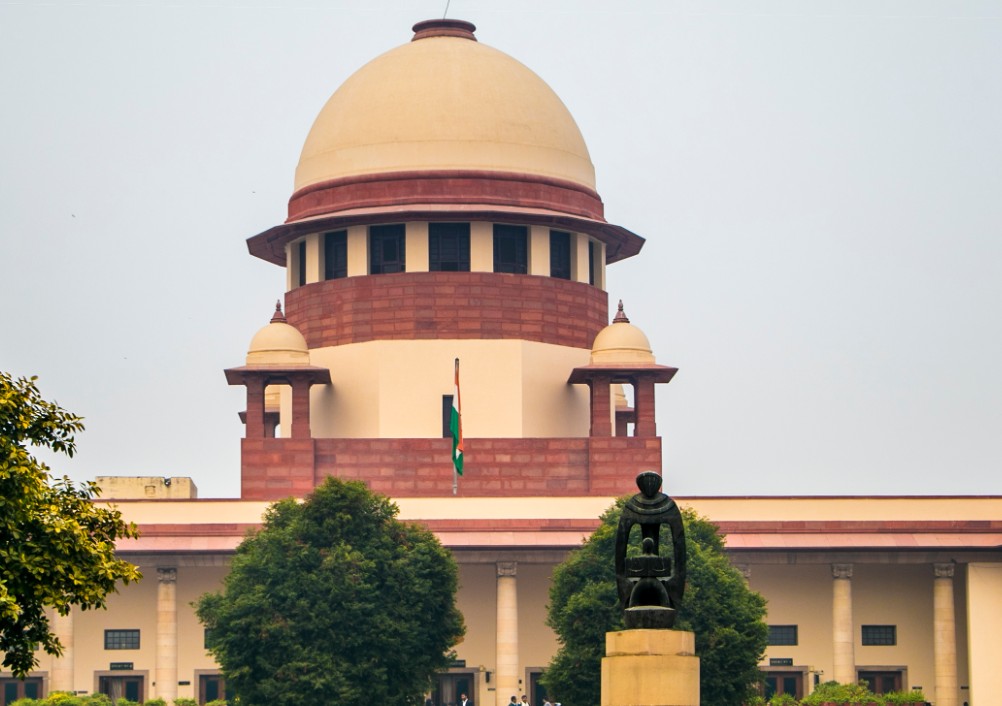In CIVIL APPEAL NO.14524 OF 2015-SC- SC quashes AFT’s order directing formulation of policy for filling up Air Vice Marshal post, says Tribunal subject to HC’s jurisdiction under Article 226, can’t be permitted to direct framing of such policy by Govt
Justices Abhay S. Oka & Sanjay Karol [14-12-2023]

Read Order: Union Of India &Ors v. Air Commodore Nk Sharma (17038) Adm/lgl
Tulip Kanth
New Delhi,December 15, 2023: The Supreme Court has held that challenging the basis of promotion after having participated in the process on consideration of promotion and having been declared unsuccessful thereunder, is not a valid ground to impugn the policy/method.The Apex Court made the observation while dismissing the plea of an IAF Officer who had participated in the Promotion processand only challenged the non-formation of a policy for filling up the vacancy of AVM JAG (Air), finding himself to be unsuccessful in securing a promotion thereto.
The Civil Appeal in question had been filedat the instance of the Union of India, against the judgment whereby the Armed Forces Tribunal, Principal Bench, New Delhi directed the reconsideration of the recommendation of the Promotion Board with respect to the Officerafter formulating the policy for filling up the AVM rank post in the JAG (Air) Department by convening a separate Promotion Board.
The Respondent, commissioned in the Administrative Branch of the Indian Air served in the JAG department and was appointed as the Judge Advocate General (Air) [JAG (Air)]. In the year 2012, the post of JAG (Air) was upgraded to the rank of Air Vice Marshal.
The grievance of the Respondent was that upon superannuation of the previous JAG (Air), despite meeting the criteria for promotion to AVM, no promotion board was formed to consider the Respondent for the aforesaid vacancy and instead, it was eventually decided that he would be considered for promotion in his parent branch along with his course mates in Promotion Board 1/2015. He was recommended for the position of AVM, which was not accepted by the Ministry of Defence (MoD). It was due to such non-acceptance of the recommendation of the Promotion Board thatthe dispute began.
When the matter reached the AFT, it was decided that given the position of JAG (Air) had been upgraded in light of the recommendations made by a High-Power Committee constituted in compliance with the directions given by the Delhi High Court in Ex-Rect-/Rfn Nahar Singh v. UOI (WP(C) 12853/2005), the consideration of the case of the Respondent herein, under a policy where he could be promoted against a legal vacancy by competing with his batch mates working in the administrative branch was an exercise in futility.
One of the main issues in this case was regarding the Tribunal’s powerto issuea direction to the Government to frame a policy for filling up the post of JAG (Air).
Referring to the Armed Forces Tribunal Act, 2007, the Division Bench, comprising of Justice Abhay S. Oka &Justice Sanjay Karol stated that disputes in respect of promotions and/or filling up of vacancies is within the jurisdiction of the Tribunal but it cannot direct those responsible for making policy, to make a policy in a particular manner.
The Bench placed reliance upon Union of India v. K. Pushpavanam&Union of India &Ors v. Ilmo Devi &Anr, wherein it has been emphasized that framing of any scheme is no function of the Court and is the sole prerogative of the Government.Thus, the Bench came to the conclusion that a Tribunal functioning within the strict boundaries of the governing legislation, would not have the power to direct the formation of a policy.
“After all, a court in Writ jurisdiction is often faced with situations that allegedly fly in the face of fundamental rights, and yet, has not been entrusted with the power to direct such formation of policy”, the Bench said while also noting that it has been clarified by 7 Judges of this Court in L. Chandra Kumar v. Union of India &Orsand Bench of 5 judges in Rojer Matthew v. South Indian Bank Ltd &Orsthat a Tribunal would be subject to the jurisdiction of the High Court in Article 226 of the Constitution.
The Bench observed that had the Respondent been found suitable for promotion to AVM, hissuperannuation would have moved forward from 57 years at which he was due to superannuate upon not being promoted.
“Therefore, given that the determination of the age of superannuation is within the domain of Executive policy, of which the Tribunal was fully aware, and that, even while seeking to do complete justice, this court ought not to, in ordinary circumstances, look past the commonly accepted age of superannuation, it is clear that the order of the Tribunal is sans basis”, the Bench remarked.
Citing PradeepKumar Rai v. Dinesh Kumar Pandey&Tajvir Singh Sodhi &Ors. v. State of Jammu Kashmir &Ors, the Bench concluded, …the Respondent’s challenge was barred at first instance, as he participated in the Promotion Board of 2015 and only challenged the non-formation of a policy for filling up the vacancy of AVM JAG (Air), finding himself to be unsuccessful in securing a promotion thereto.”
In view of such observations & findings, the Top Court allowed the appeal & quashed the order passed by the Armed Forces Tribunal.
Sign up for our weekly newsletter to stay up to date on our product, events featured blog, special offer and all of the exciting things that take place here at Legitquest.




Add a Comment